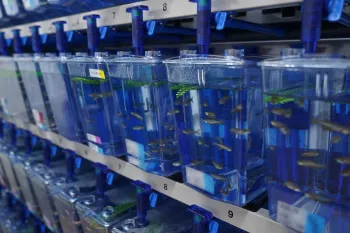
BSIP

Jo-Anne McArthur / We Animals
Animal testing and research
We're working around the globe to replace cruel, outdated animal experiments with innovative non-animal methods.
Animals don’t deserve to be used in experiments. Animal testing is a practice that belongs in the past. It’s time to prioritize animal testing alternatives that are safer, faster, and more reliable for humans—without causing animals to suffer.
ultimately fail in human trials, according to the National Institutes of Health.
are estimated to be used in harmful experiments each year globally.
have enacted full or partial bans on cosmetics animal testing.
Kierstin Luckett & Lauren Rager/Chimp Haven
Al, a 51-year old chimpanzee previously used in biomedical research, sees his new sanctuary home for the first time. This is just one victory but so many dogs, monkeys, rats, and other animals are still suffering in labs. Act now and together, we can continue to help save animals from a horrific fate.
Kathleen Conlee recalls her past, working in a monkey research facility. The experience was only the beginning of her work with animals, and led to her leading the fight to alleviate and end the suffering of animals in laboratories. Hear her story.
Join us to help replace cruel, outdated animal experiments with innovative animal-free methods. Sign a petition today.
Animal testing is expensive, time consuming and proven less reliable compared to non-animal advancements. It's time to take the suffering out of science.
Brussels — Nearly 400,000 fish have been used in chemical safety tests required by the EU’s REACH regulation—with a further 530,000 to 690,000 projected to suffer following recent regulatory changes
MONROVIA, Liberia―In advance of World Chimpanzee Day (14 July), animal charity Humane World for Animals (formerly called Humane Society International) has released thought-provoking photographs of
WASHINGTON―Horseshoe crab populations are on the decline, partly attributed to the use of their blood in medical testing. For decades, an effective replacement to the horseshoe crab blood-derived test
Start saving lives by making a one-time gift today. You can also help animals all year long with a monthly contribution.
Meredith Lee/Humane World for Animals